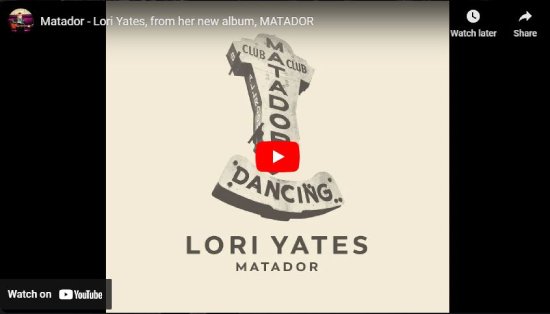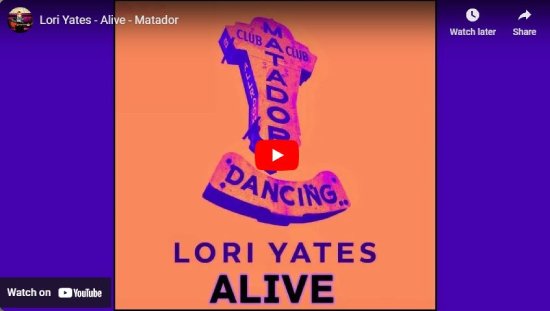Lori Yates’s home-office shelves are lined from floor to ceiling with journals. These tattered, well-loved notebooks, filled with poems, song sketches, and other ruminations, date back to her teenage years. On the same wall hangs a treasured sunburst 1960 Gibson LG1 acoustic guitar that Yates purchased with money received from a Hamilton Arts Award in 2022. These are the simple tools of the songwriter’s trade. Since penning her first song at 14, the acclaimed artist has never contemplated doing anything other than making music.
“I’ve spent my whole life singing and making records,” says the 63-year-old, who recently released Matador – her eighth solo record – to critical acclaim.
Reflecting on this storied career, that spans more than four decades, gobsmacks the singer-songwriter. Such longevity is impressive, especially in an industry that’s sometimes fickle, and oftentimes cutthroat. From her independent country-punk roots on Queen Street in the early 1980s fronting bands The Last Resorts and Rang Tango to her solo major label debut (1988’s Can’t Stop the Girl on Sony Nashville), and personal excess, her songs are what’s kept Yates not just in the game, but also from going insane.
Songwriting has been a constant companion, and is therapeutic for her. Despite releasing eight records, the songs Yates has written that reach the public’s ears are few and far between. The pages of those journals include hundreds of unfinished ideas; still other songs are complete, but in Yates’s mind, not quite good enough to record. “As a songwriter, I’m a germinator,” she says. “It takes me a while to find tunes that I feel are worthy… I’ve got lots of B-sides, and tons of C sides!”
Before the pandemic, Yates spent many years focused on sharing her knowledge of what it takes to write a song with others interested in learning the craft and finding their authentic voice. Before COVID-19 ended these popular workshops, Yates held 30 Creative Genius Songwriting courses – sharing her gift with more than 100 aspiring songsmiths.
Matador, released independently, features seven new songs, along with a pair of older tunes, including a re-working of “Time After Time” – a co-write with the late, revered Texas songwriter Guy Clark. It had previously appeared on Can’t Stop the Girl, but Yates felt the song never received enough promotion. The rest of the songs were cultivated, and bloomed, during the pandemic’s dark days.
When COVID-19 hit, grief already had a hold on Yates. Mired in depression, dealing with the deaths of two close family members, she felt stuck. Yates started a livestream, via Facebook, to help get out of her head. Every Tuesday, during the prolonged lockdown, with the live music industry shuttered, these living-room sessions not only brought Yates some needed income, but also gave her a chance to woodshed newly-written songs.
“At first, I watched artists I admired, like Patti Smith and Rickie Lee Jones, do livestreams and make mistakes,” she says. “Then, at my son’s urging, I started a weekly gig of my own… It saved my life.”
Yates was surprised to discover she had an engaged audience who returned regularly, from as far away as Argentina. Through these weekly, no-frills gigs, the material for Matador was born. “I didn’t set out to make a record, but because live gigs had dried up, I figured it was probably time to get back in the studio anyway,” she says. “The nice thing about the livestream is that I could tell immediately from the hearts and the bubble emojis which songs were winners.”
As pandemic restrictions loosened, and caseloads dropped, her old pal and mate in many a band, Blue Rodeo bassist Bazil Donovan, invited Yates to lay down some demos at the Woodshed, his band’s intimate studio. The sessions were overseen by JUNO Award-winning engineer/producer Tim Vesely, of Rheostatics.
“I trusted him,” Yates says of letting Vesely co-produce Matador. “I arrived with just my acoustic guitar and these melodies. I asked for – and listened to – his opinions… Tim had such great sensibilities.”
The result is nine songs that linger. The maudlin and moving cuts get better with each listen. Yates says that these are compositions she would never have written early in her career. Take, “Alive,” where she sings, “It’s good to be alive/ Even when it hurts to be alive.” In this heartfelt ballad, Yates has no regrets over the past, and chooses to live in the present. She’s filled with gratitude for the life she’s been given, especially the gift of 34 years of sobriety. Only now, as a member of what she dubs “The Club” (anyone over 50), can she write such personal songs.
“My writing has really matured since I wrote my first song,” says Yates. “I can tackle subjects today that I wouldn’t have been interested in talking about when I was 20 years old. Getting better as a writer has always been my goal. I’ve always competed against myself.”
With Matador, Yates has no plans to tour extensively. Besides a monthly set at Toronto West-end bar Motel, she only plans to play select gigs when the opportunity arises and the spirit moves her. In between these performances, she’s busy writing new songs, fulfilling T-shirt orders, working on a memoir, and preparing a one-woman show, based on stories of a colourful life, well lived.
“I’ve written a lot of bad songs and maybe a couple of good ones,” she says. “That journey continues, whether [or not] I’m popular, or there are eyes on me. I just want to say things now that I hope other people can relate to. It takes bravery to speak your truth… I feel I’ve finally found my authentic voice.”
Yates is a mentor to many songwriters. During her stint in Nashville, in the first decade of her career, she learned from hit-makers like Wendy Waldman and Don Schlitz. Today, her lyrics (for the song “Angels with Bloody Knees”) are immortalized alongside words written by Robbie Robertson, Stan Rogers, Daniel Lanois, and Terra Lightfoot, in Hamilton’s Gore Park, as part of an art installation that honours the city’s music-makers. Asked for one piece of songwriting advice, Yates is quick to answer. “Find your truth and your voice, and write from that voice,” she says. “I know some writers don’t write like that, but as listeners, we recognize when songwriters speak their truth, so lay your guts on the table if you can. It might take a while to get there, but that’s my best advice… be authentic.”

